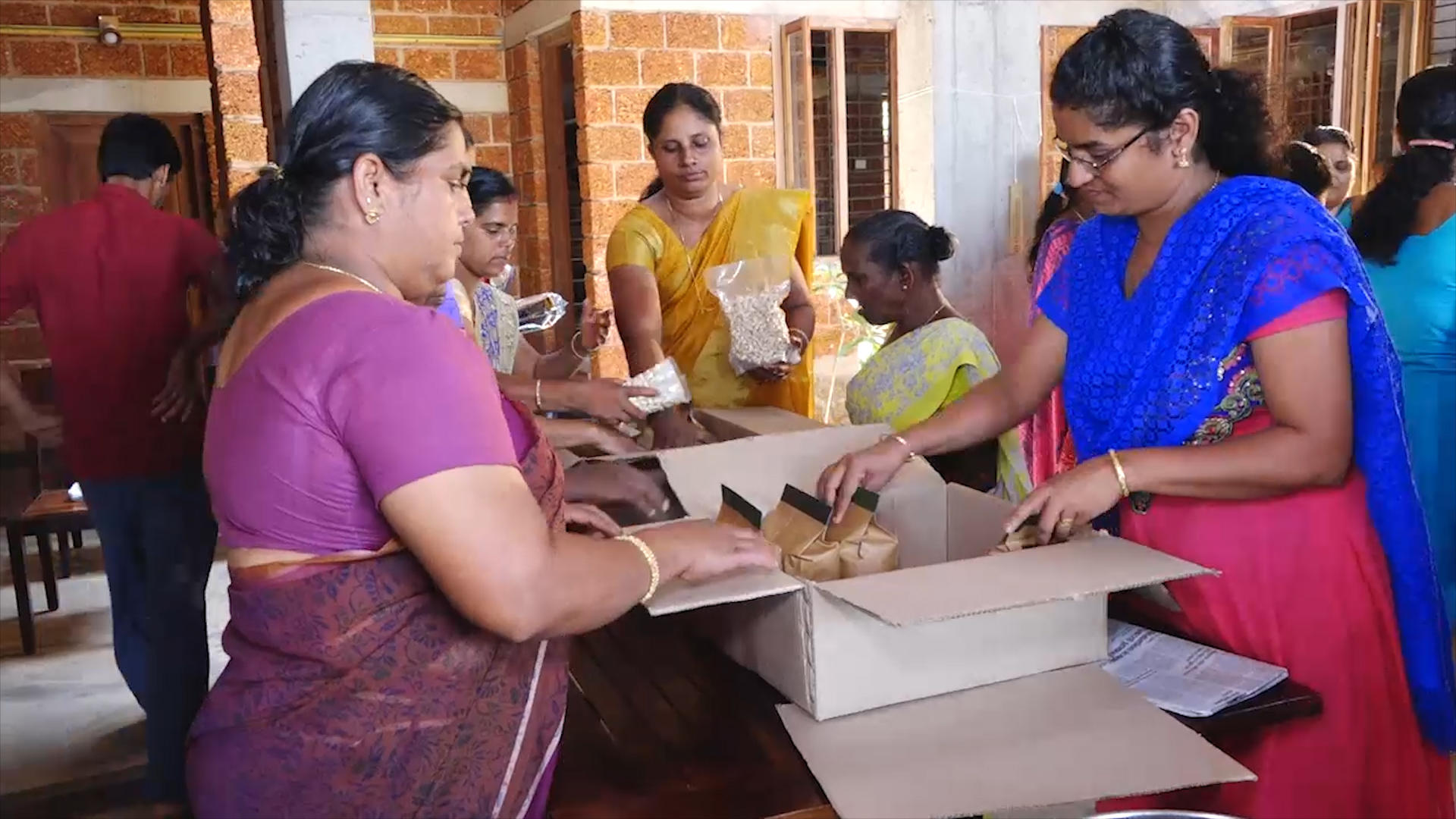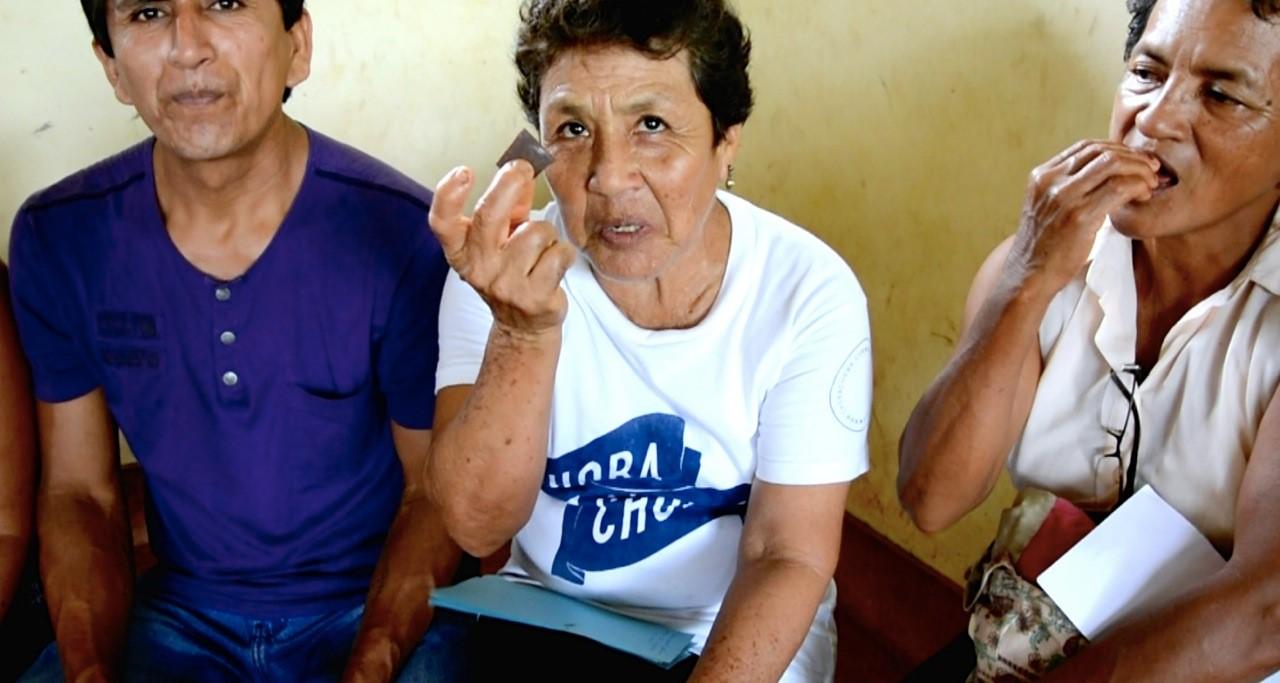Small farmers reap benefits of Swiss crowdfunding boom

Would you pay in advance for something you’ve never seen if it’s for a good cause? Crowdfunding projects in Switzerland are giving Swiss consumers a taste for the exotic and helping small farmers find new markets.
Tobias Joos is sweaty and a bit out of breath. Nothing unusual for the part-time bike courier who delivers packages around Zurich city to supplement his income. But today is a bit different. Joos has a special delivery to make: ten boxes of spices from India that he sourced from small farmers through his crowdfunding project Crowd ContainerExternal link.
His team managed to raiseExternal link almost CHF84,000 ($84,000) on Swiss crowdfunding platform Wemakeit through over 500 people who placed orders for a box of spices shipped directly from farmers in the India state of Kerala.

More
From small Indian farms to Swiss plates
Joos is no ordinary do-gooder. He studied international relations in Geneva and worked for two years at the consultancy firm Ernst & Young before finding his calling. Determined to do something about the unequal trade relations between rich and poor countries Joos joined a company that sold fair trade nuts from various countries. He was sent to India to develop a supply chain for cashewnuts and coconut oil and that is where he met with small farmers in Kozhikode in the state of Kerala.
“The farmers were producing lots of crops on their farms but were unable to find a market for all their products,” says Joos.
From experience he knew that Swiss supermarkets and shops would not be interested in stocking their produce unless they were homogenous and had a long shelf life. A potential solution came to him when in Switzerland. He observed that people were not so picky about the appearance of produce in farmer’s markets and that they appreciated buying directly from producers. Joos decided to attempt connecting farmers in India with Swiss consumers through crowdfunding.
“In our case, clients know exactly what the farmers, processers and we get making crowdfunding the perfect tool for complete transparency, he says.
One of the first recipients of the spice box, Bettina Minder, who lives in Zurich’s old town, appears to be the ideal customer. The order was a gift for her husband.
“The person gifting it thought we would like the product and also the idea that it is directly linked to farmers,” she says. “Even in Switzerland I prefer buying directly from farmers or cooperatives,” she says.
Big investment
While it takes two to three years to make a product ready for the international market, Joos was lucky to have the right contacts and experience and learn from others about what products work and don’t work. This helped him bring his product to the market in a matter of months instead of years. But there is no escaping the fact that having a transparent and socially-responsible supply chain requires significantly more investment, especially for a small company that cannot afford independent certification.

“We welcome other initiatives that also aim to provide better trading opportunities for farmers in the global south, says Katrin Dorfschmid, spokesperson for Max Havelaar which provides fair trade certification in Switzerland.
However, she points out that crowdfunders should offer precise information to backers about how exactly their products are more ethical than others.
But even without recognised certification, transparency and a good conscience comes at a high cost to small projects.
“Buying directly from the farmers takes up a lot of time and money. It is three times more expensive for us compared to buying the beans the standard way,” says Mario Waldispühl, co-founder of El Imposible RoastersExternal link, a company that sells coffee from El Salvador.
His crowdfunding campaignExternal link managed to raise more than the CHF20,000 target needed towards a coffee bean roasting machine and hiring premises for their micro factory in the town of Horw in canton Lucerne. They source beans from eight farms in the Central American country, one of which produces only a bag (70 kilos) a year.
“You got to a shop like Globus [premium goods shop] and pay CHF40 for a kilo coffee of which the farmer gets around CHF1 or 2. We want to change that,” he says.
However, selling coffee at the same price as most high-end retailers without nowhere near the same margin is an uphill struggle. Right now, they’re barely covering costs and expect to pay themselves a salary only in two years’ time.
Others like Cattleya Romero-Faude have had to invest their personal savings into such projects. Her company SaganàExternal link imports coconut blossom nectar from small farmers in the Philippines.
“The nectar harvesters earn 30-50% higher wages than in the local market in southern Mindanao and each ton of nectar sold guarantees a month’s employment for 12 tappers,” she says.
Her crowdfunding campaignExternal link only managed to attract a quarter of the CHF15,000 target, which means she received nothing. So far, she has ploughed CHF30,000 of her own money into the natural sweetener which she’s pitching as a healthy alternative to cane sugar.
“The crowdfunding campaign failed because of a lack of local network and media exposure,” she says.
She plans on trying again and is even looking at selling cocoa, which grows as an intercrop with coconut. The others also have dreams of expansion. Joos is collecting feedback from his first round and plans to launch another round of crowdfunding if the response is positive. Waldispühl’s coffee company is looking to expand beyond El Salvador and source beans from small farmers in Nepal.
While many of these crowdfunding projects may claim to offer organic or fair trade products, few have certifications recognised in Switzerland such as Bio SuisseExternal link or Max HavelaarExternal link’s Fair Trade label. These certificates are quite expensive to acquire and each product must be assessed separately. No surprise that crowdfunders prefer to let transparency do the talking instead of labels. But what prevents them from making false or exaggerated claims of sustainability that cannot be verified by the consumer?
The Swiss Federal Consumers Affairs Bureau (FCAB) has yet to receive a complaint from suspicious or disgruntled crowdfunding backers on this issue.
“The question of organic or fair trade claims by crowdfunding projects is one of unfair competition or brand protection. It is normally up to the traders or consumers to raise the issue if they feel they are being harmed or misled,” Jacques Vifian, spokesperson for the Federal Consumers Affairs Bureau told swissinfo.ch.
When it comes to a bad financial deal, the Swiss Financial Market Supervisory Authority (FINMA) treats crowdfunding project backers as investors or financers and they are expected to bear the “risk of loss” like any other investor.
How much more would you pay for a product to ensure it is sourced ethically? Let us know in the comments section below.

In compliance with the JTI standards
More: SWI swissinfo.ch certified by the Journalism Trust Initiative













You can find an overview of ongoing debates with our journalists here . Please join us!
If you want to start a conversation about a topic raised in this article or want to report factual errors, email us at english@swissinfo.ch.